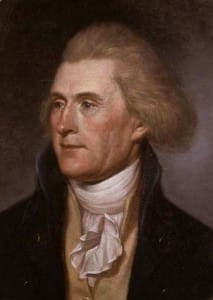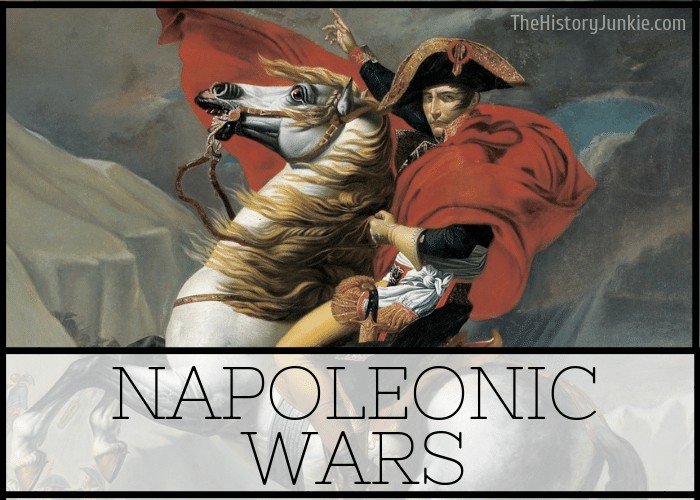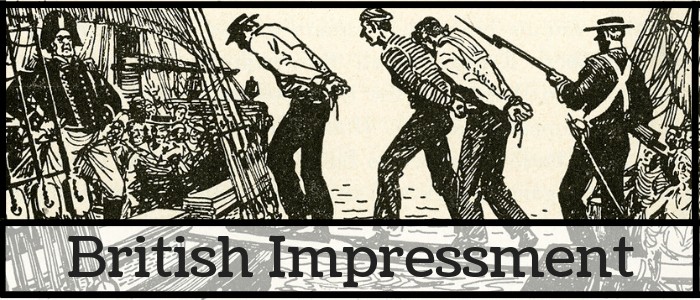There were many causes of the War of 1812 and collectively they each played a role in an eventual declaration of war against Great Britain. Many of the causes hurt the American economy and also disrespected their sovereignty.
European nations often abused America since its military was weak and the leadership could not agree on diplomatic relations with Great Britain or France.
The American Navy was in its infancy and did not have many warships in comparison to Great Britain and France.
This left the young nation vulnerable and unable to defend its borders.
European Conflicts
Since the age of exploration, the European superpowers had their hand in developing the North American continent.
After the American Revolutionary War, European powers still continued to involve themselves in American affairs.
Napoleonic War: Although it was not the first event, the rise of Napoleon after the French Revolution was a serious issue for the world and would become one of the causes of the War of 1812.
It threw all of Europe into a long war that moved to a global stage when the two world powers began to fight over the colonies.
President George Washington avoided European conflict, as did Presidents John Adams and Thomas Jefferson.
However, the Napoleonic Wars caused both European powers to become more aggressive against the United States.
The XYZ Affair: A diplomatic incident that resulted in the Quasi-War with France during the Adams Administration. Most likely the result of the United States accepting the Jay Treaty, which posed restrictions on United States trade with France.
Series of Embargo Acts: Thomas Jefferson imposed an Embargo Act in 1807, which ruined the American economy. The Embargo Act was unpopular and was modified repeatedly to put pressure on Great Britain by blocking American imports.
It only hurt the American economy. Jefferson’s mess was left to be cleaned up by James Madison.
1804 treaty between Quashquame and William Henry Harrison: A treaty known as the Treaty of St. Louis was signed by William Henry Harrison and Quashquame. Quashquame represented the Sauk and Meskwaki tribes. The treaty hurt relations with the Sauk Indians causing most to side with the British during the War of 1812.
Violation of American Sovereignty
The United States was only 20 years old when the War of 1812 broke out and even though an entire ocean separated them from Europe they found it difficult to be recognized or taken seriously by other European nations. Nations did not respect American sovereignty and often violated it.
Impressment: Great Britain and France both impressed American sailors in the late 18th and early 19th centuries. The British were much more aggressive and it became a serious issue for many American leaders.
It was clear that the British were flexing their Naval power and violating American sovereignty. Impressment is one of the ways that the British Royal Navy recruited and built their navy. It would become one of the main causes of the War of 1812.
Chesapeake-Leopard Affair: The affair was a quick naval engagement off the coast of Norfolk, Virginia. The British warship HMS Leopard and the American frigate USS Chesapeake engaged in a short battle when the Leopard pursued, attacked, and then boarded the Chesapeake.
The British commander boarded and looked for Royal Navy deserters. Four men were taken from the Chesapeake and were tried with one being hanged for desertion. This event was one of the primary causes of the War of 1812.
American Expansionism
American expansion was part of the American mindset during the 19th century. After the Revolution, pioneers continued to blaze trails and found new towns. Thomas Jefferson bought the Louisiana Purchase which doubled the size of the nation and allowed more pioneers to push further west.
American’s believed that the entire continent was theirs to be had, which included the land that belonged to the Indians and even British Canada.
British Canada: Canada had always been something that the Americans wanted ever since Benedict Arnold led the Invasion of Canada during the American Revolution.
With Great Britain embroiled in a global conflict with France, their resources were stretched and Americans saw an opportunity to push the British out of North America.
Britain’s Support of Native Indians: After the Revolution, Great Britain did not remove many of its forts located on the frontier.
They often supplied Indians with ammunition to halt any expansion into the new territory. This was a violation of the Treaty of Paris that was signed after the American Revolution ended.
Louisiana Purchase: The purchase doubled the size of the nation and sent pioneers west to settle more towns. The result was that the Natives that owned the land were now being pushed or forced to share their land with American settlers.
Many of these fringe settlements suffered massacres and Indian raids. While the nation doubled in size, its relations with the Native Americans continued to crumble.
President Thomas Jefferson's Second Term

His idealism and loyalty to France caused much friction between the United States and Great Britain.
The rise of Napoleon also shattered his idealistic notions that surrounded the French Revolution as some sort of offshoot of the American Revolution.
His economic sanctions on his own country crippled the economy and his de-arming of the military and his use of gunboats for the defense of America did little to intimidate the European powers.
When James Madison took over the Presidency he inherited a weakened military and a nation that had doubled in size.
Jefferson’s administration had terrible relations with England, France, and the Native Americans but hardly a military to combat them. The nation was ill-prepared but hungry for war.


